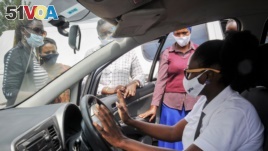25 October 2020
The women fought with each other inside the vehicle. The driver pulled away from the hold around her neck. Then she turned to hit her attacker. She threw open the door to make her escape, ending the simulated attack.
"This one is too strong for me," the attacker said, smiling and shaking her head. Then it was another woman's turn in the exercise to prepare drivers for Uganda's new all-female taxi service, Diva Taxi.

FILE - Rebecca Makyeli, right, spokeswoman for Uganda's new all-female ride-hailing service Diva Taxi, trains new drivers in self-defense skills in Kampala, Uganda, Sept. 28, 2020.
The service was developed by a local woman who lost her job at the start of the coronavirus crisis. It launched in June and has brought in more than 70 drivers. They come from every walk of life, from college students to mothers. And they hope to make good use of their used Toyota cars.
"It started off as a joke" but the idea grew more real, said company spokesperson Rebecca Makyeli. Her close friends and family supported the idea. "They said, 'Why not?' So, we called it Diva Taxi."
It is uncommon to find women taxi drivers in Uganda. In the socially conservative East African country, most women work on farms or find informal jobs.
The International Labor Organization has said women's jobs in developing countries will likely be hit harder than men's in the pandemic.
"I should say I was personally affected by COVID," Diva Taxi founder Gillian Kobusingye told The Associated Press. COVID-19 is the disease caused by the coronavirus.
Kobusingye was someone who traveled often. But she found herself at home with little to do as officials launched restrictions to slow the spread of the virus. For several weeks, even taxis could not operate in Uganda.
Still, Kobusingye felt hopeful. She knew that people would soon need transportation.
And she believed that a woman seeking a driving job was likely to want it more than any man. She also thought women were more dependable.
"Our ladies are extremely hardworking," she said. "They do it with one heart compared to other people, and that's the difference we have with our competitors."
Some clients, including men and women, agree.
"The divas are always on time," said Kampala-based Jemimah Bamwebaze. She is a regular user. She also feels safer being driven by a woman.
To get a job with Diva Taxi, drivers must have a car in good condition. And their cell phone must have the app that clients use. The drivers also need to have a good driving record. And they must show proof there are no issues with Interpol, the international policing organization.
With Diva Taxi, 85 percent of profits from a trip goes to the driver. That is very low pay in Uganda, but part of a plan to grow the market, Makyeli said.
Driver Donna Ochen is an accountant for U.S.-based company FedEx. Ochen was let go from her job in March. She had been "doing nothing" at home when she saw a Diva Taxi worker on television discussing jobs for women. With permission from her husband, she called the company and got the job.
"I decided to take it up" because it would be a chance for me to serve and earn (for) and support my family, Ochen said. And "it would empower me to do something for myself rather than sitting."
Another driver is college student Tracy Abola. She said her mother, a teacher, had been out of work since schools were closed in March. Abola was driving a 1998 Toyota when she learned she could make money with Diva Taxi.
"So, I decided to do something so that I can also help a bit at home," she said.
The Diva Taxi app has been downloaded at least 500 times. And each of the company's 72 drivers makes an average of 30 rides each week, Makyeli said. The company expects to have 2,000 users by the end of this year. That is a small number in Kampala, the capital city, with a population of more than 3 million. There, taxis and passenger motorcycles are the main means of transport for working people.
Every driver gets security training and a can of pepper spray, but safety remains a big concern.
Ochen said she drives only during the day "to avoid being caught up in any tricky situations," including with groups that have been drinking alcohol. Even though she hopes to return to her job as an accountant, she plans to remain a Diva Taxi driver for as long as possible.
And even founder Kobusingye is sometimes a driver herself. "I can't wait to partner with every woman out there that is willing to be part of Diva Taxi."
I'm Alice Bryant.
The Associated Press reported this story. Alice Bryant adapted it for Learning English. Susan Shand was the editor.
_______________________________________________________________
Words in This Story
simulated – adj. not real but made to look, feel, or behave like something
diva– n. (U.S. definition) a famous and successful woman who is very attractive and fashionable
informal (jobs) – adj. jobs that are not taxed or monitored by any form of government
pandemic– n. an occurrence in which a disease spreads very quickly and affects a large number of people over a wide area or throughout the world
client– n.a person who pays a professional person or organization for services
app– n. a computer or cell phone program that performs a special function
pepper spray – n. a substance made from a chemical found in peppers that causes temporary blindness and pain to the nose, throat, and skin when it is sprayed on someone